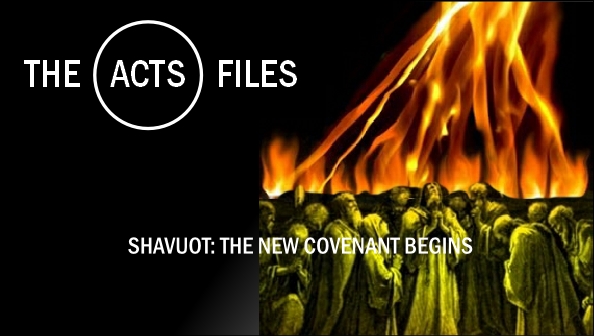By Tyson Thorne

Acts chapter two starts off like a Hollywood blockbuster with supernatural action kicking into high gear. We’re told that when Shavuot – The Feast of Weeks, or Pentacost – began the apostles were right where they were supposed to be, in Jerusalem just as Jesus had commanded. Sounds from the morning temple service echoed throughout the city. The service was just ending and the blasts of silver trumpets sounded clearly, the pure tones reflecting off stone buildings and finding its way into a large upper room where the apostles are gathered, each tending to his own business.
Suddenly a sound like a fierce wind whooshed around them, drowning out the trumpets, and something like a cloud of fire raged overhead. The flame ran the length of the stone ceiling before dividing itself into parts that resembled fiery tongues and alighting on each of them. Miraculously, none suffered injury and instead each found themselves being indwelt by God’s Holy Spirit!
The sound and fiery light was so terrible a sight and sound that a crowd was drawn to their location. Men began beating on the door demanding an explanation. They didn’t know what had occurred, but knew it was something special, something important. Before the door could be broken down it opened wide and the twelve came out to meet the onlookers and explain.
As dramatic as this depiction is, it is based on historic facts. Tomorrow we’ll examine verses five through 13, but today I want to make sure we understand the full implications of this event. On this day circa 30 AD, for the very first time, the Holy Spirit came to live within the believer. Not temporarily, as had occurred in the past, but for the believer’s entire life. While the Holy Spirit came upon Old Testament saints to empower, guide or teach them, he also left once his role was finished. What happened at Pentecost was indeed something special and important. It signified the arrival of a new covenant. Jeremiah prophesied:
“Indeed, a time is coming,” says the Lord, “when I will make a new covenant with the people of Israel and Judah. It will not be like the old covenant that I made with their ancestors when I delivered them from Egypt. For they violated that covenant, even though I was like a faithful husband to them,” says the Lord. “But I will make a new covenant with the whole nation of Israel after I plant them back in the land,” says the Lord. “I will put my law within them and write it on their hearts and minds. I will be their God and they will be my people.”
That prophecy is found in chapter 31, verses 31 through 33 of Jeremiah’s book and its fulfillment is in Acts chapter 2. Notice how God draws a distinction between the old and new covenants. The old was made at the time of the Exodus, a time period kicked off by God speaking to Moses from a burning bush. A sign caught Moses’ attention – a fire that did not consume the shrub. Similarly, we see the new covenant beginning with a fire that does not consume. In both cases the fire can be no other than the presence of the Holy Spirit and just as God promised Moses the ability to speak to Pharaoh, so too we see the apostles gifted with an ability to speak to the crowds. It’s not a coincidence, it’s a sign!
Today the Holy Spirit doesn’t come upon a person with such grandeur, but he comes upon them all the same. From the moment we place our trust in Jesus the Holy Spirit comes to reside inside us, to seal us for the day of the Lord, to guide us into truth, and to provide us words and wisdom in times of need. This passage is the beginning of a new era, and era that we live in today that is commonly referred to as the Church Age. But just as the old era had passed, so this one will too at the Messiah’s second coming.
|
|
|
